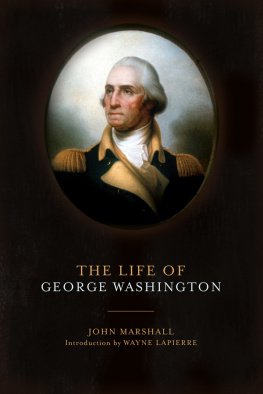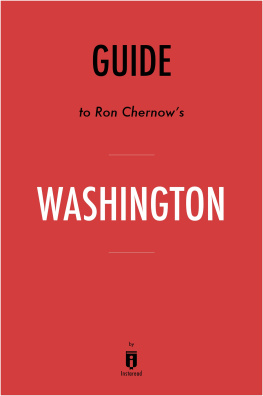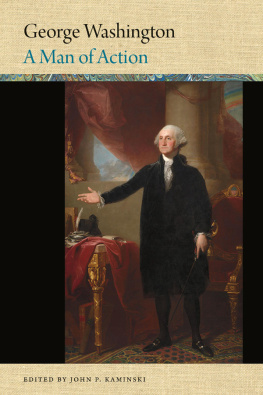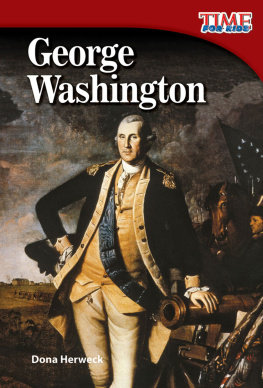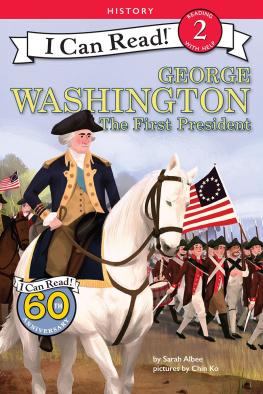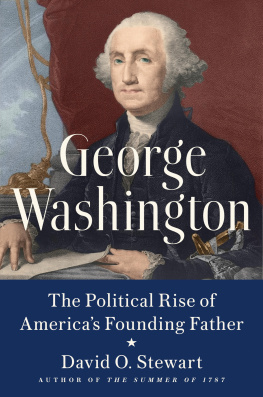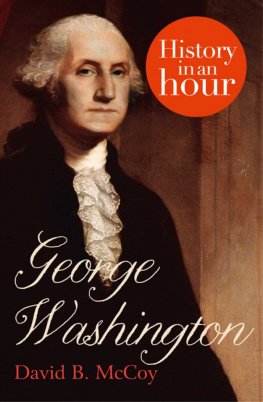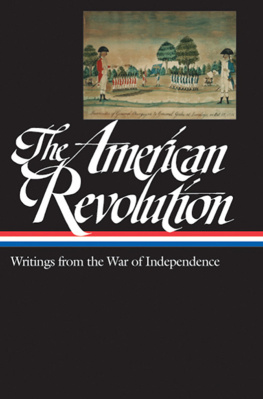George Washington
George Washington
The Wonder of the Age
JOHN RHODEHAMEL

Published with assistance from the Annie Burr Lewis Fund.
Copyright 2017 by Yale University.
All rights reserved.
This book may not be reproduced, in whole or in part, including illustrations,
in any form (beyond that copying permitted by Sections 107 and 108 of the U.S.
Copyright Law and except by reviewers for the public press), without written
permission from the publishers.
Yale University Press books may be purchased in quantity for educational, business,
or promotional use. For information, please e-mail
(U.S. office) or (U.K. office).
Designed by James J. Johnson and set in Miller and Cochin types
by Integrated Publishing Solutions.
Printed in the United States of America.
Library of Congress Control Number: 2016939283
ISBN 978-0-300-21997-5 (hardcover : alk. paper)
A catalogue record for this book is available from the British Library.
This paper meets the requirements of
ANSI/NISO Z39.48-1992 (Permanence of Paper).
10 9 8 7 6 5 4 3 2 1
Jack, Sam, Catherine, Anna
Contents
George Washington
1
Look Around You
GEORGE WASHINGTON never took much interest in his ancestors. When he was an old man, and the new president of the new United States of America, he would reply politely to an aristocratic English genealogist who had written for help in tracing the Washington family tree. Courtesy, however, did not disguise Washingtons pointed little lecture on the promise of the great experiment then under way in America. For the Americans had set out to create a new society, one guided by the faith that a persons rank should be grounded on attainment rather than ancestryby the faith that all people were created equal.
His own ancestry was a subject, President Washington wrote the genealogist, to which I confess I have paid very little attention. My time has been so much occupied in the busy and active scenes of life from an early period of it that but a small portion of it could have been devoted to researches of this nature.... We have no Office of Record
Washingtons subtext might have read: In republican society, people, though born equal, still sought the honors supplied elsewhere by the trappings of aristocracy. A kind of republican peerage might exist, but entry into its ranks did not require fortunate birth but rather demonstrated talent, ambition, and a virtuous devotion to the public good. Washington had been too busy winning honor to study his lineage.
So much honor did he win that His Excellency General George Washington may seem an unlikely champion of the revolutionary principle that all people are created equal. In death as in life, Americans have revered Washington as a mythic figure, remote in his icy majesty. We cannot forget that he was the master of three hundred slaves. He was commander of officers and men in their thousandsthe generalissimo awarded quasi-dictatorial powers by the Continental Congress in 1776. He was a consummate political actor who became Americas first elected head of state. Washington was also a high-living Virginia gentleman possessed of vast tracts of land and of all the luxuries wealth could command. He was an authentic classical herothe American Cincinnatussaid to have countless admirers but not a single friend. He was a proud but insecure man who could confuse dissent with disloyalty.
Yet this same George Washington was a revolutionary, for a quarter-century the central figure in a radical revolution that aimed at nothing less than the transformation of Western civilization. When Washington was born, in 1732, the British colonies in North America were obscure and inconsequential outposts. The courts of Europe had long been the focus of the Atlantic world. All the principal European states were ruled by hereditary monarchskings and queens, emperors and czarswho reigned by virtue of their carefully recorded pedigrees. In Britain the king was constrained by a constitution that compelled him to govern with the consent of Parliament. But even in England the king was the unquestioned head of state. Just beneath royalty revolved the glittering constellations of aristocracyproud lords and highborn ladies. They too were exalted by birth far above the common run of men and women. Government-by-birth appeared the most satisfactory model for ordering society, one that had prevailed for centuries and promised to persist into the remote future.
When Washington died, in 1799, the eighteenth century was coming to a close, while the age of hereditary power, the very notion of government-by-birth, had been started down the road to extinction. And the United States of America, overleaping its small beginnings on the margins of European civilization, would one day thrust itself into the forefront of world history. The little republic would become a gigantic continental democracya nation unlike any that had come before. The promise of equality may never be realized. Nevertheless, the American Revolution made the theory of popular government a reality for the first time, furnishing a compelling alternative to the ancient tyranny of kings. American success marked a fundamental turning point in human affairs.
That success may have been out of reach without Washingtons leadership. Of course, George Washington did not make the Revolution: it was the work of the American people. The man who described himself as a figure upon the stage in the greater Drama... now acting on this Theatre emerged as a flawless performer, taking his cues from his audiencethe people themselves. Although many Americans were shut out of the political process, participation by white men was widespread. They could draw on ideals born in the classical republics of antiquity. Many had studied the political theorists of the Enlightenment. They took pride in the venerable constitution of Britain itself, the set of traditions that, Britons and their British-American cousins boasted, made England the most free nation on earth. The Americans drew as well on their own unique heritage as inhabitants of fluid, quasi-republican colonial societies.
Still, at every stage of the drama, George Washington played the leading role. Thomas Jefferson supposed that to Washington belonged the singular destiny and merit, of leading the armies of his country successfully through an arduous war for the establishment of its independence; of conducting its councils through the birth of a government, new in forms and principles, until it settled down into a quiet and orderly train; and of scrupulously obeying the laws through the whole of his career, civil and military, of which the history of the world furnishes no other example.
Revolution is a perilous enterprise. You have a republic, but only if you can keep it, Benjamin Franklin had warned after the delegates signed the new Constitution in 1787. Would it prove, as philosophers predicted and history had confirmed, that the republican government demanded by the principle of equality could never provide the bonds of power needed to hold together a large and diverse nation? Was it inevitable that, in a few years or decades, the United States would be forced to abandon popular representation and resort to despotism? Would the infant republic fragment into a set of squabbling petty sovereignties?
We know the outcome of the experiment. Those living through its early years could not. But they did understand what was at risk. They were contending for what Washington called a blessing to Millions yet unborn.
Next page

